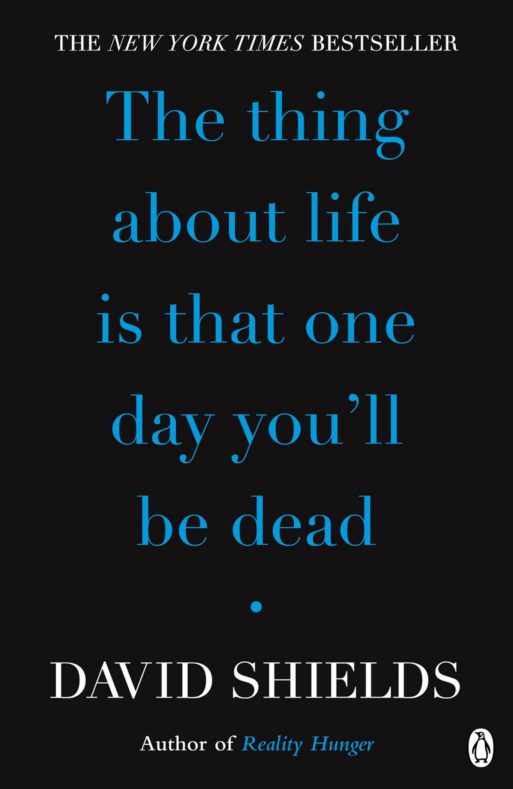 At 97 years old, David Shields’ father was still a firecracker with a fierce sense of optimism. Shields simply couldn’t explain how a man of that age could retain such vigor for life, and he was determined to figure out his father’s secret. What followed is “The Thing About Life is That One Day You’ll Be Dead,” a non-fiction novel that is part memoir, part poetry, part high school science textbook and part stream of consciousness.
At 97 years old, David Shields’ father was still a firecracker with a fierce sense of optimism. Shields simply couldn’t explain how a man of that age could retain such vigor for life, and he was determined to figure out his father’s secret. What followed is “The Thing About Life is That One Day You’ll Be Dead,” a non-fiction novel that is part memoir, part poetry, part high school science textbook and part stream of consciousness.
On some level, Shields seems to know that tackling a subject like death and the meaning of life is a near-impossible task, which is why he approaches his book from as many angles as possible. He turns to the great philosophers and their musings on the fragility of life when he wants to evoke beauty. He turns to scientists when he wants to describe the chemical changes that are happening in our bodies. He turns inward when these quotes and facts fail to answer his deepest questions.
In each section, he breaks up hundreds of facts, quotes and memories into subchapters that read almost like the ramblings of a physician’s diary.
The book is broken up into four distinct parts that follow the structure of human life: infancy and childhood, adolescence, adulthood and middle age, and finally old age and death. In each section, he breaks up hundreds of facts, quotes and memories into subchapters that read almost like the ramblings of a physician’s diary.
For instance, in the chapter “Decline and Fall,” Shields begins one paragraph with, “Your IQ is highest between the ages of 18 and 25.” By the end of the paragraph, he’s quoting Goethe, who says, “Whoever is not famous at 28 must give up any dreams of glory.” By the start of the following paragraph, he’s moved on to talking about the high point of his life, when he heard that a woman had written “David Shields is a great writer and a babe to boot” in a bookstore women’s restroom. At first, this writing style is jarring, but by the time you get to page two, you’ll find a rhythm in it.
Every fact leads in to the next, even if the two seem unrelated at first.
Although Shields covers a lot of ground in this book, he does so meticulously. Every fact leads in to the next, even if the two seem unrelated at first. While many other authors focus on the moment of death or the few years leading up to it, Shields tries to capture it all, exposing the chaotic contradictions of life as he goes.
This is the kind of book that should be read at least twice: once to dive into the complex emotional themes, and again to let the fascinating facts sink in. Skip so much as a single sentence, and you’ll likely miss the point of the entire chapter.

Credit: flickr.com
David Shields is at his strongest when he talks about what happens in the body from the time of conception up until the time of death. There’s a lulling comfort in these passages that even the finest poetry can’t elicit. Hearing all of a body’s basic functions listed in a neutral tone takes away the need to find the meaning of life, if only for a moment. In these passages, you’re reminded that your body is just a body — a series of connected tissues and nerves, chemical reactions and electric impulses.
As we age, these basic functions evolve and eventually deteriorate. While Shields touches on the anxiety attached to this process, he is quick to point out that it is the quintessential human experience. Just as the inevitable changes in the body that accompany puberty can be frightening for adolescents, as adults we are frightened by the changes in our bodies as we age and approach death. Yet these, too, are a natural part of life.

 “The Thing About Life is That One Day You’ll Be Dead” by David Shields
“The Thing About Life is That One Day You’ll Be Dead” by David Shields


 The Spiritual Symbolism of Cardinals
The Spiritual Symbolism of Cardinals
 Meaning-Focused Grief Therapy: Imaginal Dialogues with the Deceased
Meaning-Focused Grief Therapy: Imaginal Dialogues with the Deceased
 Flawed Kidney Function Test Discriminated Against Black Patients
Flawed Kidney Function Test Discriminated Against Black Patients















Exercise is not about suffering and pushing yourself; it’s about being healthy and having enjoyable at the similar time.
Report this comment